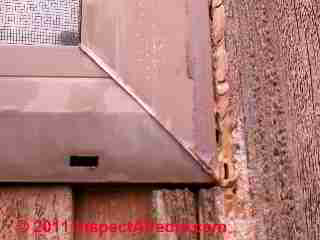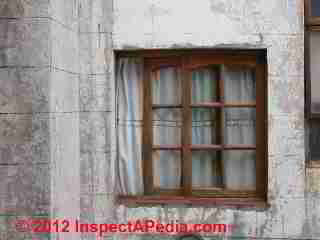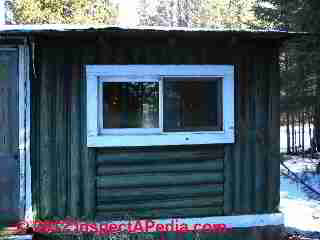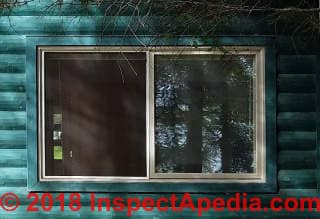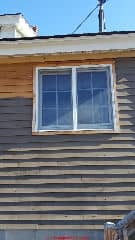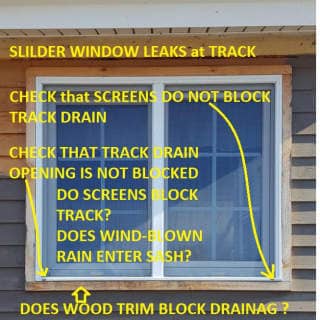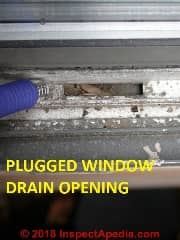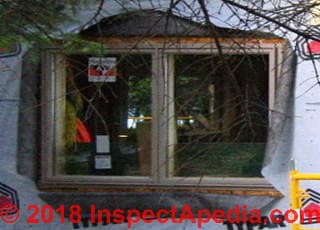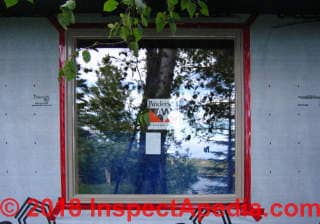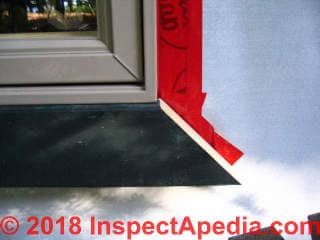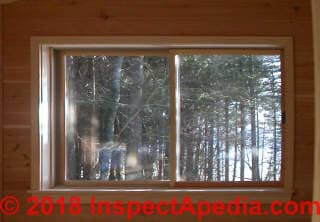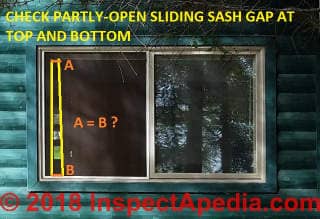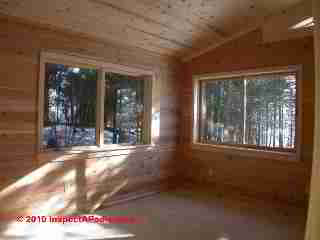 Defects in Slider or Glider Windows
Defects in Slider or Glider Windows
Installation, Sliding Window Leaks, Repairs
- POST a QUESTION or COMMENT about gliding / sliding window problems
Guide to slider or glider windows & window inspections for defects & leaks.
This article describes common defects (air or water leaks, out of square, operating difficulties) found in slider windows used in residential buildings
InspectAPedia tolerates no conflicts of interest. We have no relationship with advertisers, products, or services discussed at this website.
- Daniel Friedman, Publisher/Editor/Author - See WHO ARE WE?
Sliding Windows or Gliding Window Inspection, Troubleshooting, Leak Repair
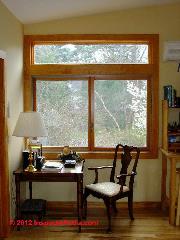
Slider windows such as the page top installation on a cabin in Northern Minnesota and at left at a New York home can offer large horizontal expanses of glass and operable sash that do not interfere with interior or exterior space.
Our photo shows Anderson gliding windows (photo-right) that we [DJF] recently had installed during a log cabin renovation in Two Harbors, MN.
As discussed in Best Practices Guide to Residential Construction (Steve Bliss, J Wiley & Sons) Chapter 3, BEST PRACTICES GUIDE: WINDOWS & DOORS, designing a window that slides sideways presents some challenges that we list here:
- The lower track must rely on weep holes to drain away water, and second, any grit that collects in the lower track tends to impair the sliding action.
- If the weeps clog up, water may find its way into the sill
or framing over time. Also, pushing a stuck window sideways
is an awkward motion that tends to strain the back.
Also see STORM WINDOW WEEP HOLES. - As with double-hung windows, ventilation is limited to roughly 50% of the framed opening, and slide-by weather-seals are less effective than compression seals. And if the slider is large enough it can also qualify as an egress window.
List of Glider / Slider Window Defects
To avoid problems with slider windows, look for high-quality windows that slide freely. Also, consider alternatives such as a picture window with a casement along one side for ventilation. On some glider windows, especially high-volume lower-quality units we [DJF] have observed these defects:
- Lost window glass seal and condensation in insulated glass gliding windows [see photo below right]
- Improper installation of the glider window into a rough opening and ultimately finish opening that is out of square. The result can be poor window sealing, difficulty latching the window shut, and air or water leaks.
- Air leaks around the window frame
- Water leaks into the building wall and rot or insect damage traced to a gliding window frame that does not drain properly, possibly debris-clogged drain openings
- Sloppy flashing or caulking around the window leading to leaks into the building walls
- Vicinity caulking at windows - is not a problem unique to gliding windows, our photo (above left ) shows what we call "vicinity caulking"
- the installer placed caulk "in the vicinity of" the joint between the window and the building exterior siding.
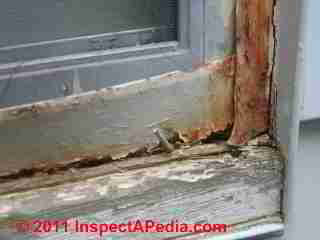
Openings in sealant around windows allow water to leak into the wall. A casual inspection may see caulk and not recognize that the caulk or sealant was not applied effectively.
Most modern windows include an installing flange that deters leaks into the wall cavity at these defects, but sending wind-blown rain behind the wood siding on the home in our photo above risks siding damage and rot or insect attack on the structure.
- Rust-out of the frame or track on steel-framed glider windows.
We suspect that clogged sliding window track drain openings contributes to this problem, shown in our photo [above-left].
Examples of Antique & Site-Built Slider/Glider Windows
Above we illustrate a wood framed sash multi-light sliding window installed in a stone masonry building in Buenos Aires (below left), circa 1935.
Below a site-built wood frame slider installed in a Minnesota cabin constructed in the 1930s. At page top is an interior view of the same cabin after extensive restoration and with a new, larger sliding window installed in the same location.
Below is the renovated cabin wall and window for the same cabin.
Questions & Answers about Sliding or Gliding Windows
Question:books on details of antique metal sliding windows?
Are there any book or article in the website that shows details or sections of an old metal sliding window? (or gliding window, I don't know the correct name) thanks! - M.O.
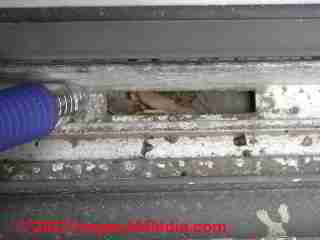
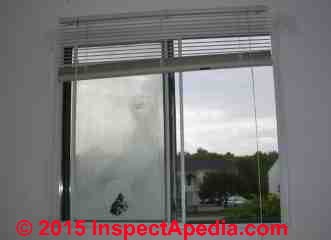
Reply:
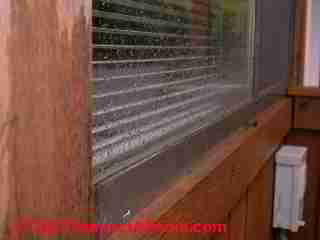 We call them sliding windows but window manufacturers such as Anderson Windows & Doors calls them gliding windows.
We call them sliding windows but window manufacturers such as Anderson Windows & Doors calls them gliding windows.
Our photos at left illustrate a 1970's metal frame slider window that was one of most on a condominium complex, all of which had lost their seal, leading to fogging between the panes of the double-glazed unit.
Our slider windows above show a clogged drain opening in the lower track of a 1980's vintage metal-frame sliding window (above left) and an aluminum framed gliding window in an apartment in New York (above right).
If you can describe a specific question or concern we'll be glad to do more research.
You will find sliding door and sliding window (or gliding door gliding window) manufacturers, repair instructions, and parts catalogs at
SLIDING GLIDING DOOR MANUFACTURERS & REPAIR GUIDES
Slider Window Leak Diagnosis / Repair
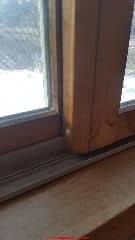 Question: how to stop the draft on my Andersen slider windows
Question: how to stop the draft on my Andersen slider windows
2019/02/01 Joseph Abruzzese said:
Is there an adjustment to stop the draft on my Andersen slider windows. It's mostly at the bottom where the windows meet.
This Q&A were posted by the reader originally at the bottom of this page.
[Click to enlarge any image]
Reply:
Joseph
I think your Anderson slider window has more than air leaks.
I also see water stains on the bottom of the wooden window frame, suggesting there has been wind-blown rain or snow-melt leakage too.
- Original installation & squareness: Start by checking that the windows are basically square in the frame. That's a most-common cause of leakage: a bad original installation.
- Flashing & sealant (caulk): I'd also check the window flashing and siding details outside to be sure water is not leaking in around the frame.
If the installer omitted or skimped on a window pan flashing and on proper flashing and sealing around the window that can be a source of water and air leaks. - Latching: Also check that when the window is shut you remembered to latch it - otherwise it's loose and not sealed.
- Damaged track or seals: Next slide the window open and inspect for any chipped, cracked, broken slider track or damaged or lost flashing
Other steps taken by some window repair techs:
- Leaks at screws: Remove the sash and remove and re-seal with a dab of caulk any screws that penetrate the plastic covering of the sash
- Find the exact leak point: start by directing a hose low on the window into just the track, then work your way up each side and ultimately to the window head or top.
Have a helper watch for the appearance of water inside.
Additional suggestions are at WINDOW / DOOR AIR LEAK SEALING HOW TO - Call product support: Finally, if using a hose outside to find the leak point doesn't show the exact leak cause, it's time to call Anderson to ask for help from a factory rep.
Website: www.andersenwindows.com/support/ Telephone: 1-800-426-4261
A search of the company's help files for the word "slider leak" or even just "leak" finds only one article - on door air leakage.
I have installed and lived with Anderson slider windows that look a lot like yours and that have not leaked, so it's possible to have a weather tight window.
Below is the only Anderson slider window repair article I could find but it may be of some help in showing how the E-series slider window sashes are removed and replaced:
ANDERSON SLIDER WINDOW KEEPER REPLACEMENT GUIDE [PDF] Anderson Windows, retrieved 2019/02/01 original source: awwebcdnprdcd.azureedge.net/-/media/aw/files/technical-docs/service-guide/9069181.pdf
Take a look at the lower corner of the window glass and give us the exact Anderson window identification and date code - that will permit window-specific research.
Reader Follow-up:
Joseph said:
The water damage was from before I bought the house and stripped and replaced the exterior of the house and while doing that I flashed every window on the exterior.
Just window comes through.
We recently had bad wind-blown rain storms on that side of the house and there was no water leaks. Thank you for the information.
CG-4 2-01.7 the numbers that I found on the window in the lower right corner. And here is a picture of the exterior of my window
Moderator Reply:
Have you looked closely at the track to make sure that the drain holes on the outside are not blocked and that the J channel around the window is not trapping water?
I have on occasion found water running down a window sash, overwhelming the drain openings in the track, filling the slider track, and overflowing to the inside.
Do not modify your window without Anderson's advice; but FYI in some cases I've added or enlarged drainage openings on the inner track vertical vanes.
FYI the number after the CG indicates the plat location, so CG-4 2-01.7 means plant location No. 4.
Contact Andersen WindowCare Service directly at 1 (888) 888-7020.
Reader follow-up:
I have checked all of that the water is draining properly out side. For some reason I could see daylight at the bottom where the two sliders meet and that is where the wind comes in.
Moderator reply: a slider window leak checklist
What a puzzle.
Clearly we ought never see daylight between two sliding window sashes when peering at them from inside. That sounds like a misfit, misalignment, or lost gasket. If you can manage a sharp closeup of what you see that'd be helpful.
The window sliders are latched, right?
Are the slider sashes both square in the frame? If you open a slider and then move it nearly-closed and examine the vertical opening is it uniform in width, to bottom?
Is the slider frame itself square? Measure the two diagonals carefully and compare those dimensions.
Are there other windows of the same model on the home with which we can compare the bad behaver?
I will review our files and add some photos of where to check for leak sources on Anderson sliding windows as well as other brands.
The predominant opinion among contractors is that when a slider or glider leaks it's faulty installation, occasionally a plugged or blocked drain in the track, or a missing section of weather stripping, and often improper or missing flashing outside around the window.
However Joseph's window leak is still under investigation.
For other readers, on this page we focus on sliding windows, installation, leak troubleshooting, &c. Some additional window leak diagnosis and repair articles at InspectApedia.com are listed below.
WINDOW / DOOR AIR LEAK SEALING HOW TO
SKYLIGHT LEAK DIAGNOSIS & REPAIR
Check These Details When Diagnosing a Leaky Sliding Window or Door
Besides checking the sliding or gliding window (or sliding door) track for debris and clogging (illustrated above), check the window installation history and any photos taken during construction. Those may give us information about the proper or improper flashing and other installation details.
Then check the window sash and frame (or door) for squareness, as we illustrate below.
Below: Photos of an Anderson sliding window during installation and as completed, inside and out, with some leak checkpoint tips. (This window has been installed for about ten years and is not leaking). These details will also help diagnose a leaky sliding door.
Above, the contractor, Nightmareworks Construction who does beautiful carpentry but horrible tiling and mechanical work (RADIANT HEAT MISTAKES ) installed this Anderson sliding window with the housewrap cut away from the framed opening.
Later he taped the window frame and flashing to the housewrap (shown below on another window on the same building). I prefer to wrap the housewrap into the opening.
In our next window installation detail you can see that the contractor used a pan flashing below the window.
Below is the Anderson Slider with the installation complete, viewed from outside.
And below, the same window viewed from the building interior.
The photo is a little distorted from processing. The window frame and trim are actually plumb and close to square.
Since the window sashes are factory made and would be expected to be perfectly square, if the sliding window sash does not sit squarely in its frame, the frame was installed out of square, perhaps improperly shimmed during construction.
Measure the two diagonals of the window frame to check for plumb and square.
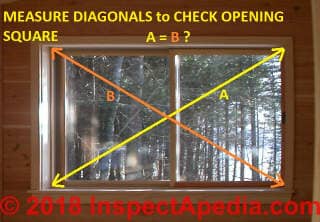
Then open the sliding sash an inch and measure the distance between the sash edge and the window frame opening at top and bottom. Those measurements should be the same.
I'm showing the same Anderson sliding window from outside but actually you will make the gap measurements from the interior side of the window.
At this window the sash gap was NOT uniform at top and bottom, but even if the window frame is slightly out of square, when the sashes are latched together when closed the window should not leak. And this one does not leak air nor water.
Missing Weather stripping at Leaky Sliding Windows?
If your sliding window was intended to have a factory-included weather strip along the top, sides, or bottom, check the condition of the weather stripping. On some leaky sliding glass doors that I've inspected the weather stripping had been pushed to one side leaving a gap while on others it was damaged or lost completely.
Skylight & Window Manufacturers & Product Sources
- Andersen Windows and Doors
www.andersenwindows.com
Skylights and roof windows with exterior sash clad with
glass-fiber-reinforced material
Customer support: www.andersenwindows.com/support/ Tel: 1-800-426-4261 - ANDERSON SLIDER WINDOW KEEPER REPLACEMENT GUIDE [PDF] Anderson Windows, retrieved 2019/02/01 original source: awwebcdnprdcd.azureedge.net/-/media/aw/files/technical-docs/service-guide/9069181.pdf
- ANDERSON WINDOW & PATIO DOOR REPLACEMENT PARTS CATALOG [PDF] (2006) retrieved 2019/02/05 original source: https://www.andersenwindows.com/-/media/aw/files/technical-docs/parts-catalog/partscatalog-windows-patiodoors-introduction--400series--200series.pdf
- Anderson GLIDING WINDOW SASH REPLACEMENT 200 SERIES[PDF] retrieved 2019/02/08 original source: https://awwebcdnprdcd.azureedge.net/-/media/aw/files/technical-docs/service-guide/serviceguide-0005338.pdf
If you have any questions about your ability to complete this procedure, call Andersen at 1-888-888-7020 for further direction. - Anderson GLIDING WINDOW TRACK REPLACEMENT 100 SERIES [PDF] retrieved 2019/02/08 original source: https://awwebcdnprdcd.azureedge.net/-/media/aw/files/technical-docs/service-guide/serviceguide-9000596.pdf
- Anderson: VINYL & FIBREX® SCRATCH REPAIR [PDF] ] retrieved 2019/02/08 original source: https://awwebcdnprdcd.azureedge.net/-/media/aw/files/technical-docs/service-guide/serviceguide-9014621.pdf
- Anderson GLIDING PATIO DOOR PARTS CATALOG 100 SERIES [PDF] retrieved 2019/02/08 original source: https://awwebcdnprdcd.azureedge.net/-/media/aw/files/technical-docs/parts-catalog/partscatalog-patiodoors-2009-present--100series-gliding.pdf
- Anderson CASEMENT WINDOW SASH REPLACEMENT 400 SERIES 200 SERIES CASEMENT [PDF] retrieved 2019/02/08 original source: https://awwebcdnprdcd.azureedge.net/-/media/aw/files/technical-docs/service-guide/serviceguide-0003911.pdf
- Milgard Windows and Doors www.milgard.com Skylights with aluminum frames (thermal break optional) with vinyl subframes on operable models; optional motorized controls with rain sensor
- Pella Windows and Doors www.pella.com Wood interior, aluminum exterior, optional motorized controls, and manual or motorized fabric-pleated shades
- Roto Frank of America www.roofwindows.com Wood interior, aluminum exterior, optional motorized controls, and manual or motorized fabric-pleated shades; Sweet16 model fits 16 in. o.c. framing
- Velux America Inc. www.velux.com Skylights and roof windows with wood interior and aluminum-clad exterior. Options include insect screens, blinds, motorized controls and shades with rain sensor, electrochromatic glass, and flashing kits for metal and tile roofs and mulled units
- Skylight Light Tube Manufacturers & Sources
- SolaTube www.solatube.com Light tubes from 10 to 21 in. in diameter; options include electrical lighting, daylight dimmer, and integral bath fan
- Sun-Tek Skylights www.sun-tek.com Light tubes from 10 to 21 in. in diameter; options include electrical lighting and multitube Spyder skylight
- Velux America Inc. www.velux.com Sun Tunnel light tubes from 14 to 22 in. in diameter with flexible or rigid tubes
Industry Associations for Windows & Doors
- American Architectural Manufacturers Association (AAMA) www.aamanet.org
- Efficient Windows Collaborative www.efficientwindows.org
- National Fenestration Rating Council (NFRC) www.nfrc.org Sustainable by Design www.susdesign.com
- Shareware calculators for sun angles, solar heat gain, and shading
- Window and Door Manufacturers Association (WDMA) www.wdma.com
- - Adapted and paraphrased, edited, and supplemented, with permission from Best Practices Guide to Residential Construction (Steve Bliss, J Wiley & Sons) .
See our WINDOW TYPES, GUIDE article series where we describe the selection and installation of windows and doors, following best construction and design practices for building lighting and ventilation, with attention to the impact on building heating and cooling costs, indoor air quality, and comfort of occupants.
There we review the proper installation details for windows and doors, and we compare the durability of different window and door materials and types.
Question: trouble finding replacement sliding window carriage wheels
(Nov 13, 2011) Kirk Hansen said:
We live in a 30-year old condo apartment. Two or three of our sliding windows have wheels (one of the two wheels on each window) that have seized up. I've tried to free one with WD40-type spray, and can now turn it with difficulty, but it's not close to free-rolling. So it seems I need to replace it.
Two questions:
-It looks hard to remove the carriage+wheel that's there now. (Aluminum carriage, held in by slight fold over of the window projecting vanes, whatever those are really called. No screw.)
-I've found hundreds of carriage+wheel arrangements on the web, but not one that matches the size I need.
Do you have any suggestions?
Reply:
I would remove an old carriage track from your sliding windows - you may have to remove one model window in this process but it's worth it.
Then take that track to a window supplier. Chances are you can match the track profile and track height with a replacement unit that fits in the same space.
Question: do I need a landing at sliding glass door?
(July 3, 2012) Anonymous said:
There will be 2 steps with a rise of 8" (run of 10") to a sliding glass door, which leads into the house. Do I need a landing?
Reply:
I recommend a landing at any exterior door. Your local building inspector is, however, the final authority; that's where you should start.
...
Continue reading at WINDOW / DOOR AIR LEAK SEALING HOW TO or select a topic from the closely-related articles below, or see the complete ARTICLE INDEX.
Or see these
Window & Door Leak / Repair Articles
- FLASHING on BUILDINGS - home
- WINDOW FLASHING & SEALING GUIDE
- FLASHING DOORS, DETAILS
- FLASHING MEMBRANES PEEL & STICK
- FLASHING MEMBRANE FAQs
- SKYLIGHT LEAK DIAGNOSIS & REPAIR
- SKYLIGHT LEAK TROUBLESHOOTING
- SLIDING GLIDING DOOR MANUFACTURERS & REPAIR GUIDES
- SLIDING GLIDING WINDOW DEFECTS
- WINDOW & DOOR FLASHING TAPE DETAILS
- WINDOW / DOOR AIR LEAK SEALING HOW TO
- WINDOW LEAKS INTO BASEMENT
- WINDOWS & DOORS - home
Suggested citation for this web page
SLIDING GLIDING WINDOW DEFECTS at InspectApedia.com - online encyclopedia of building & environmental inspection, testing, diagnosis, repair, & problem prevention advice.
Or see this
INDEX to RELATED ARTICLES: ARTICLE INDEX to DOORS & WINDOWS
Or use the SEARCH BOX found below to Ask a Question or Search InspectApedia
Ask a Question or Search InspectApedia
Questions & answers or comments about gliding / sliding window problems.
Try the search box just below, or if you prefer, post a question or comment in the Comments box below and we will respond promptly.
Search the InspectApedia website
Note: appearance of your Comment below may be delayed: if your comment contains an image, photograph, web link, or text that looks to the software as if it might be a web link, your posting will appear after it has been approved by a moderator. Apologies for the delay.
Only one image can be added per comment but you can post as many comments, and therefore images, as you like.
You will not receive a notification when a response to your question has been posted.
Please bookmark this page to make it easy for you to check back for our response.
IF above you see "Comment Form is loading comments..." then COMMENT BOX - countable.ca / bawkbox.com IS NOT WORKING.
In any case you are welcome to send an email directly to us at InspectApedia.com at editor@inspectApedia.com
We'll reply to you directly. Please help us help you by noting, in your email, the URL of the InspectApedia page where you wanted to comment.
Citations & References
In addition to any citations in the article above, a full list is available on request.
- Basic Housing Inspection, US DHEW, S 352.75 U48, p.144, out of print, but is available in most state libraries; New York State version, ca 1955, source of our window parts and window repair sketches.
- Best Practices Guide to Residential Construction, by Steven Bliss. John Wiley & Sons, 2006. ISBN-10: 0471648361, ISBN-13: 978-0471648369, Hardcover: 320 pages, available from Amazon.com and also Wiley.com. See our book review of this publication.
- Decks and Porches, the JLC Guide to, Best Practices for Outdoor Spaces, Steve Bliss (Editor), The Journal of Light Construction, Williston VT, 2010 ISBN 10: 1-928580-42-4, ISBN 13: 978-1-928580-42-3, available from Amazon.com
- The Journal of Light Construction has generously given reprint permission to InspectAPedia.com for adaptations, quotations, or reproductions used at this website. All rights and contents of the JLC material are ©Journal of Light Construction and may not be reproduced in any form.
- In addition to citations & references found in this article, see the research citations given at the end of the related articles found at our suggested
CONTINUE READING or RECOMMENDED ARTICLES.
- Carson, Dunlop & Associates Ltd., 120 Carlton Street Suite 407, Toronto ON M5A 4K2. Tel: (416) 964-9415 1-800-268-7070 Email: info@carsondunlop.com. Alan Carson is a past president of ASHI, the American Society of Home Inspectors.
Thanks to Alan Carson and Bob Dunlop, for permission for InspectAPedia to use text excerpts from The HOME REFERENCE BOOK - the Encyclopedia of Homes and to use illustrations from The ILLUSTRATED HOME .
Carson Dunlop Associates provides extensive home inspection education and report writing material. In gratitude we provide links to tsome Carson Dunlop Associates products and services.


